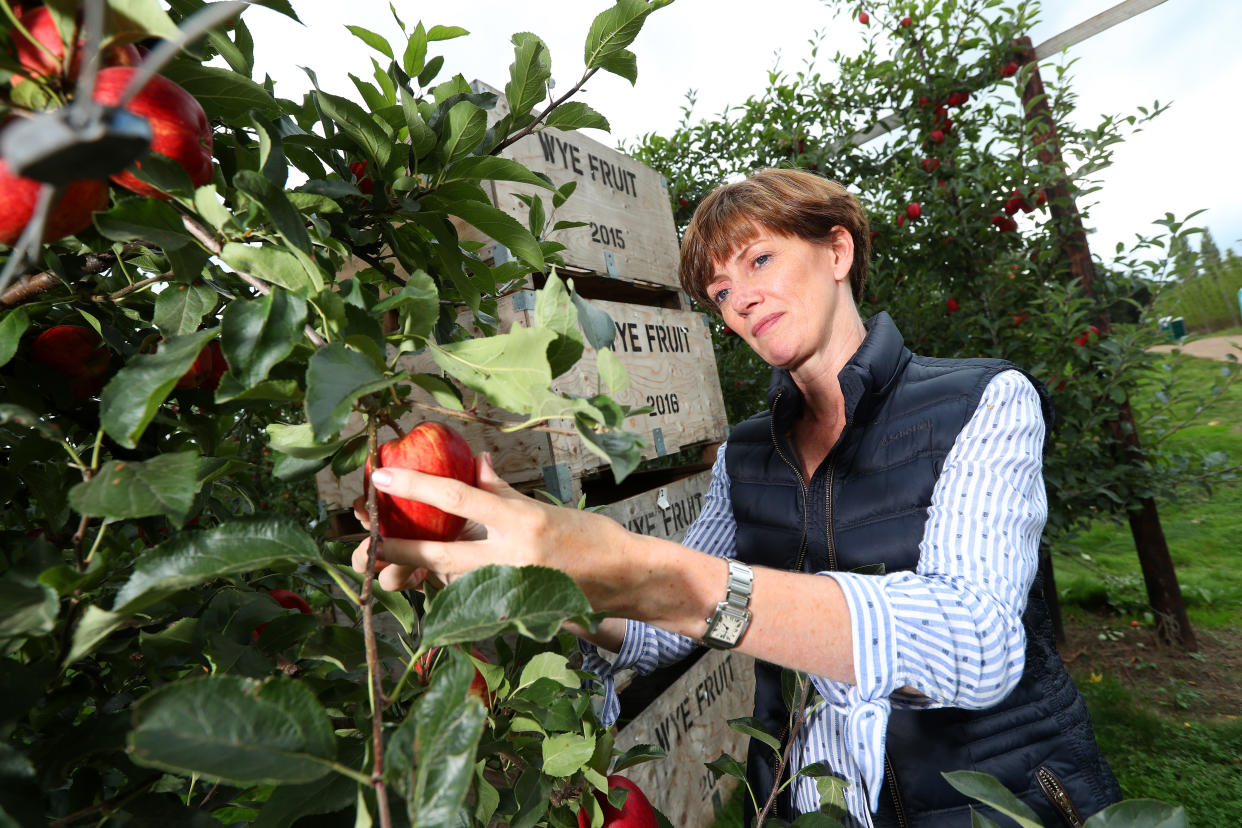UK risks 'empty shelves' for fruit and veg as farms lose EU workers

UK shops could face shortages of fresh fruit and vegetables next year because of a “perfect storm” of Brexit immigration reforms and border checks, a farming leader has warned.
Ali Capper, chair of the National Farmers’ Union (NFU)’s horticulture board, slammed a “head-spinningly unbelievable” clampdown on migrant workers announced last week by the government.
Speaking exclusively to Yahoo Finance UK, the apple farmer warned a lack of pickers will threaten harvests just as imports of fresh EU produce face new border checks from January 2021.
“Checks are pretty scary because that means delay. When you’ve got a perishable product, delay means rotting fruit and vegetables,” she said in an interview at the NFU’s annual conference in Birmingham. “Will we have empty shelves? Will prices go up? Yes.”
Read more: UK business chiefs atttack ‘insulting’ government rhetoric on low-skilled workers
It echoes a British Retail Consortium warning of “significant disruption” to fresh produce availability earlier this month, when the government confirmed EU imports face new paperwork and checks. A 2019 study predicted these and other trade changes will raise UK apple prices by 2.9% and other fruits by up to 7.6%.
But UK farmers’ main fear in horticulture, which includes fruit, vegetables, plants and flowers, is a crippling shortage of staff to pick and pack their own produce.
Radical shakeup of Britain’s immigration system
The government unveiled its post-Brexit immigration system last week. From next year it will end the free movement of EU workers, who fill up to 60% of jobs in horticulture. They will have to apply instead through seasonal and other worker visa schemes that used to mainly cover non-EU nationals.
Only 10,000 spaces have been created on a new pilot seasonal worker scheme, when farmers say they need 70,000 during the harvest. Meanwhile farmers will struggle to secure general work visas for migrants as their sector is not included on an approved list of shortage occupations.
Capper said she was “staggered” the seasonal worker scheme remains only a small-scale pilot, with uncertainty over its future. Britain had a seasonal labour visa from 1948 until 2013, when it was scrapped as EU free movement was seen to make it redundant.
But while free movement will end, there has been no corresponding scale-up of seasonal visas.
‘Panic-stricken’ horticultural firms fear closure
Capper warned farming businesses would lose contracts, shift investment overseas or close without an urgent commitment to allow more permanent and seasonal migrant workers.
She was flooded with calls from “panic-stricken” fruit farm managing directors on the day of the announcement. Many then wrote to ministers, expressing their frustrations in the “strongest tone I’ve ever seen,” she said.
Read more: Priti Patel warns firms’ immigration demands would ‘recreate free movement’
“I’ll be facing supermarket customers asking if I’m confident I can pick my crop next year,” said Capper, who runs Stocks Farm on the Worcestershire-Herefordshire border. “If I’m not, I’m not going to take a contract out.”
Around 15 of Capper’s Polish workers return every year, and are “like members of our family,” she said. But she needs up to 70 seasonal workers.
Farms face staff shortages already even under free movement. NFU surveys suggest seasonal worker numbers have already fallen in recent years, and official figures show the number of EU citizens coming to Britain for work are at their lowest since 2004.
Capper blamed the pound’s decline, rising incomes in eastern Europe and Britain’s political atmosphere. “We’ve done a pretty good job making clear we don’t want people.”
She believes most voters only want immigration controlled, not to “pull up the drawbridge.”
British workers and robots
With employment at record highs, Capper said there were not enough Brits to fill the jobs instead. Even if there were, she has “no confidence” she could attract enough locals to seasonal, physically demanding outdoor work.
“Every year I try really hard to recruit local people,” she said. One recruitment drive at every college within 30 miles yielded only 15 new recruits. Only three turned up.
Read more: UK would be ‘morally bankrupt’ to allow chlorinated chicken imports
Some farmers see an answer in automation. Robots able to assess and pick apples skilfully enough are “seven to 10 years away” however, according to Capper.
Researchers around the world are currently trying to develop robotic fruit picking equipment, but the main challenge is ensuring they can identify when it is ready and pick without causing damage.
Signs of a change in policy
Capper hopes a gap may emerge between the government’s opposition to “cheap labour from Europe” and actual policy. She noted numbers of agricultural ‘guest workers’ in the US have soared even under US president Donald Trump.
Environment, food and rural affairs minister George Eustice gave the strongest signal yet on Wednesday the government may budge.
Eustice told the conference the seasonal scheme “will need to be expanded.” He also suggested he was pushing for certain farming roles to be labelled shortage occupations, helping firms recruit permanent staff.
A Home Office spokesperson told Yahoo Finance UK the government was “delivering on the people’s priorities” by introducing a points-based immigration system. He said employers should make jobs more attractive to UK staff and invest in training.
“Many people already in the UK say they want a job and businesses will continue to be able to rely on EU nationals living here,” the official added.
But Capper said firms were already at a “cliff edge” in recruiting for next year, demanding certainty soon. “They can’t keep us waiting much longer.”


